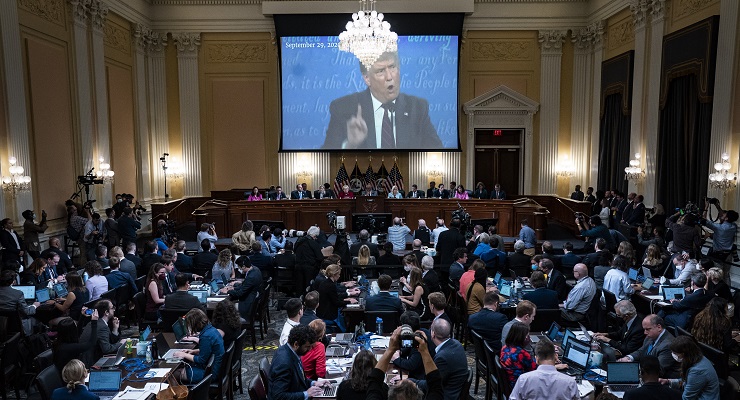
Fifty years ago this week, a security guard noticed a door taped open and rang the police. When they arrived, they discovered five burglars planting bugs inside the headquarters of the Democratic National Committee.
So began the Watergate scandal and the unravelling of the Nixon administration.
Popular memory recalls that as the facts came to light, Americans realised their president was a crook, and his Republican Party colleagues in Congress forced him to resign in disgrace. Laws were broken, justice was delivered, and the constitution prevailed.
This is both true and misleading. Yes, the Watergate arrest was the first domino in a chain that led to Nixon’s downfall. However, that outcome was far from preordained. For the first several months most of the US media ignored the story. Bob Woodward and Carl Bernstein at The Washington Post, backed by their forgotten editor Barry Sussman, chipped away layer by layer. The New York Times, the Los Angeles Times, and Time magazine also pitched in. That was about it.
Five months after the break-in, Nixon was reelected in a landslide, with more than 60% of the vote. There was no indication of what lay ahead.
It wasn’t until May 1973 that Nixon’s fortunes began to nosedive. Eleven months to the day after the burglary, the Senate Watergate Committee held its first of 51 hearings into the scandal. The hearings ran until November, and were broadcast live gavel-to-gavel into American living rooms via the major networks during the day, and replayed at night via the Public Broadcasting Service; 319 hours were aired, with 85% of households tuning for some or all of the coverage.
By November 1973, 17 months after the break-in, the burglars had been locked up, the “Saturday Night Massacre” had transpired, and a host of officials had departed the administration. Vice-president Spiro Agnew had resigned following separate bribery and corruption allegations and a felony plea for tax evasion.
Despite everything, Nixon clung on. When the hearings concluded he declared: “I’m not a crook.” And his Republican colleagues stood by him, determined to tough it out.
It took another nine months to evict him. In July 1974, the Supreme Court rejected Nixon’s claim of executive privilege and ordered secret Oval Office recordings to be relinquished to the House Judiciary Committee. At last Nixon’s words condemned him. Even then a majority of Republicans on the committee voted against all three impeachment articles. If not for the smoking gun of his own voice on the tapes, he may well have survived.
Nixon lasted more than two years before his luck ran out. This while Democrats held commanding majorities in both the House of Representatives and the Senate.
And Watergate was a garden party compared with the January 6, 2021, insurrection.
This history provides crucial context for the January 6 Committee hearings that commenced last Thursday. Pundits are parsing the evidence and testimony for new nuggets to digest. To their surprise, there have been several noteworthy revelations already:
- Multiple key Trump administration insiders — including Ivanka Trump, Trump’s 2020 campaign manager Bill Stepien, and former attorney-general Bill Barr — all confirmed that Trump lost the election, and that they told him as much. Barr repeatedly blasted the Big Lie as “bullshit”. Mark Meadows, then White House chief of staff, acknowledged in November 2020 that “there was no there there” in regard to Trump’s lies about election fraud.
- 250-300 members of the Proud Boys, the far-right white nationalist hate group, were prepositioned at the Capitol on January 6 before Trump’s rally at the Ellipse. They were outfitted to act as a breach force to overpower police and enter the building when the mob arrived. This demonstrates advanced coordination and planning, and refutes the notion that the attack was a spontaneous crowd eruption.
- General Mark Milley, chairman of the Joint Chiefs of Staff, revealed that vice-president Mike Pence was issuing orders to the military during the attack. Milley testified: “He was very animated, and he issued very explicit, very direct, unambiguous orders … Get the military down here, get the guard down here, put down this situation.” This calls into question Trump’s conduct during the attack, and why Pence had assumed command.
- Several Republican congressmen sought pardons from the White House after the insurrection. This suggests at a minimum a consciousness of guilt, and fear of prosecution. The committee has signalled its intention to unveil their identities with explicit evidence to verify the claims.
- Trump exploited the Big Lie to raise $250 million from small donors for his legal fight. These donors were misled about where their money was going and how it would be spent. Investigators have proof that Trump has already funnelled some of this money into his own pocket. Committee member Representative Zoe Lofgren declared: “Not only was there the big lie, there was the big rip-off.”
The committee also revealed previously unseen video footage that underscored the scope, scale and violence of the insurrection.
More than 1000 witnesses have given evidence to the committee. With several more hearings to come, we can expect plenty of additional disclosures. But in an era of instant gratification, there won’t be a gotcha moment that pivots the national mood. This is a marathon, not a sprint. Marvel couldn’t make a movie that would shift sentiment in two hours, or a handful of hearings.
Instead the committee has two principal tasks. First is to detail the facts for the American people, and for history. The second is to jolt the media out of their constant both sides horse race coverage and force them to do their jobs properly. The media’s herd mentality, atomised attention span and clickbait addiction is the greatest threat to accountability.
Fear and drama drive the news cycle. Last year it was COVID, critical race theory, and the Afghanistan withdrawal. In March it was Ukraine wall-to-wall. The war rages on, but has receded from the headlines. Now it’s gas prices and inflation, gun violence and trans panic. The one constant drumbeat has been the nonstop prediction that Republicans will win the midterms in November (horse race!), with zero analysis of their policies or plans. Too many journalists think their job is fortune-telling, rather than truth-telling.
Now is their moment of truth. America’s fate rests on whether the fourth estate can rise to the occasion with the gravitas it warrants. If it reports the facts, stays on the story, and holds those responsible to account, public opinion will follow.
As Trevor Noah reminded them last month at this year’s White House Correspondents’ Association dinner: “Ask yourself this question: if Russian journalists who are losing their livelihoods and their freedom for daring to report on what their own government is doing — if they had the freedom to write any words, to show any stories, or to ask any questions, if they had basically what you have — would they be using it in the same that you do? Ask yourself that question every day because you have one of the most important roles in the world.”
We are in their hands.








Noah’s words are well stated, and his intents are noble. The article appears accurate and timely. Will appealing to the American journalists’ sense of honor and duty work? Go ask Fox, or One America, or Breitbart. Facts are now irrelevant, and the good citizens of America – like many of our own – will go to whatever service will tell them what they want to hear. Sadly, I can’t see any of the Right wing media suddenly getting an attack of conscience. It’s good that the issues are being explored and dragged into the light of day, but Trump, like the firearms he’s now espousing, has become part of America’s psyche, a tumour embedded so deeply in the brain that a lot of damage will be done removing it.
If removed, how could one tell?
It might be like Homer being rid of that crayon up his nose, left over from the childhood insertion competition – he won, despite penalty for the lost one.
I agree that journalistic balance is not discharged by uncritically reporting nonsense simply because someone associated with a side is prepared to say it. If it is nonsense, the reporter is obliged to call the nonsense, by reference to some sort of objective truth. Never easy, but never attained by a media trained by Capitalism.
Journalists: eagles, lemmings or vultures. Which to be?
“It is difficult to get a man to understand something, when his salary depends on his not understanding it.”
— Upton Sinclair
Is there much weirder going on anywhere, than Barr’s latest “analysis” of Trump?
After backing Trump for so long at every strange turn, volunteering to rubber stamp and validate so many of Trump’s assertions for so long : now Barr’s saying he suddenly saw what a dick Trump was, at one stroke?
A case of “If you’re getting a lift in a Lada to wherever you – hopefully – want to get – why check out the driver”?
It was often said of a Lada that its value could be doubled just by filling the tank with West Berlin petrol.
If it were not for a citizen financing, and a couple of journalists producing on-line news, Territorians would suffocate for want of access to ‘truth’. Murdock regional print less and less content, and more and more Sky-after-dark columnists that have abandoned all they have been taught or valued.
Australian Journalists dependence upon MSM substantially gridlocked. Eagles generally individualistic. Lemmings follow, and vultures true survivalists. With or without them . . . a national choice, responsibility?
Australian MSM said to vote coalition in the last elections, but the coalition lost. That tells you the MSM is not as omnipotent as you might say. If it were, don’t you think it is strange that you aren’t controlled by the MSM, and nor are all your friends who have similar political views to yourself?
Americans are, on average, as smart as your friends are, on average. If they are voting the way the MSM tells them to, which they didn’t the last time Trump stood for president, perhaps its because that’s how they want to vote?
America is a strange place, founded by racist, theocratic imperialists who crave material goods and value possessions more than the environment.
If the purpose of representative democracy is to be representative, consider the possibility that the American system is not broken.